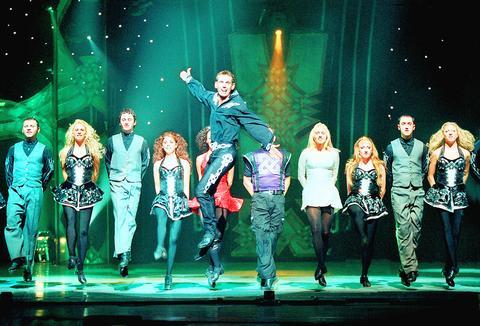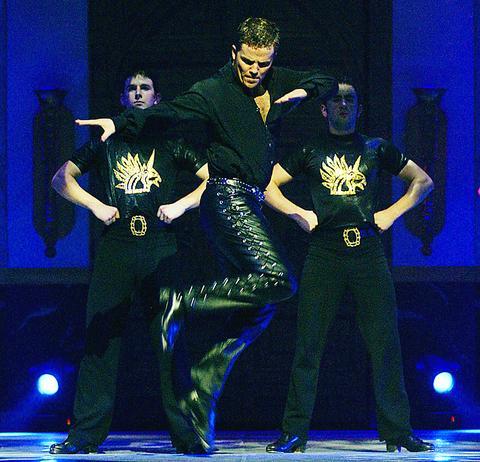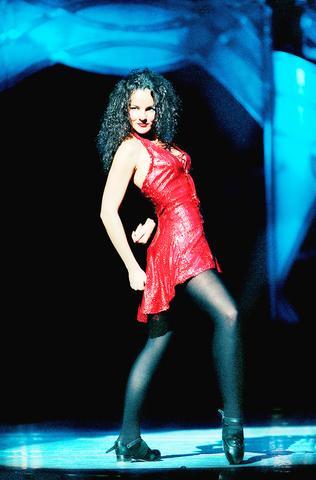In the past three years or so, there has been a growing tap dance craze in Taipei. On TV, a young girl does a solo tap dance on the balcony of European-style apartment, for a chicken stock commercial. In another ad, for instant coffee, a dancer taps his way through rainwashed streets while performing Gene Kelly's Singing in the Rain. Irish dance group The Spirit of Dance visited two years ago, as did Gaelforce last year. And this year, it is the turn of Lord of the Dance, which was founded by the renowned dancer Michael Flatley.
The group has already completed two shows, on Wednesday and yesterday, and there are five more shows to go. As expected, tickets are selling like hot cakes. So far 80 percent of the seats are gone and only a few that cost NT$3,200 are left. The attraction of Irish dance is obviously still powerful for Taiwan audiences.
Some traditional Irish dancers may be turning in their graves, but Celtic dance mixed with modern choreography and pyrotechnics is now popular in both Broadway and Las Vegas. Dancers now wear heavy and vivid make-up and proudly show off their bodies. They dance in orderly lines and raise their arms and a burst of fire erupts from the stage. It has come a long way from the traditional Irish dance previously performed in a pub, town hall or square.

PHOTO COURTESY OF KHAM ARTS
In 1998, Michael Flatley and the Lord of the Dance group of 120 dancers drove an audience of 25,000 in London's Hyde Park crazy with the groundbreaking production Feet of Flames. It then packed out Wembley Stadium for 21 consecutive nights.
Lord of the Dance is so popular around the whole world that it takes three troupes to meet with the demand for shows. In just seven years, Lord of the Dance has performed in more than 30 countries, achieving box office returns of US$400 million, 12 platinum record awards for their VCD/DVD sales, plus CD sales of 10 million.
Michael Flatley, the founder and artistic director of the Lord of the Dance (and the man who became the fastest tap dancer in the world in 1996 at 35-steps-per second; a record later broken by Michael Donnellan with 40-steps-per second), was without doubt the inspiration behind the world-wide popularity of the show.

PHOTO COURTESY OF KHAM ARTS
The former lead dancer of River Dance, Flatley left the troupe in 1996 and formed Lord of the Dance. In conjunction with composer Ronan Hardiman, Flatley developed a dance style that was more Irish, more powerful and more energetic than River Dance.
Flatley's charisma is a key to the popularity of Lord of the Dance. When he shows up on stage, he likes to run into the center of the stage with force and is greeted by cheers and screams from the audience. He has rock-star status.
In Taiwan, a fanclub and Web site dedicated to Flatley was started three years ago. Hundreds of his Taiwanese fans voluntarily translate information and news about the troupe into Chinese. For the first visit of Lord of the Dance to Taiwan, the club encouraged its members to promote and buy tickets.

PHOTO COURTESY OF KHAM ARTS
Because of the fervor of his fans here perhaps, although Flatley could not make it for the Taipei performances, he sent a message: "Our show allows us the unique opportunity to bring a little touch of Ireland to the international stage and lets our audience savor the excitement and enjoy it for themselves. Although I will not be in Taipei, I am pleased that our show has been invited to perform there," the message from Flatley said.
Lord of the Dance is now divided into three troupes. The fourth troupe will be established in March this year. The group coming to Taipei is Troupe 1, led by former dance champion Damian O'Kane, who will be playing Flatley's original role as the lord of the dance. Together with 40 dancers and 10 musicians, Troupe 1 will undoubtedly move the Taipei International Convention Center for the next three days.
"We will bring the best to our Taiwan audience. And we guarantee the entertainment will not be a tiny bit less than our shows elsewhere," said O'Kane on Tuesday at their Taipei press conference.

June 9 to June 15 A photo of two men riding trendy high-wheel Penny-Farthing bicycles past a Qing Dynasty gate aptly captures the essence of Taipei in 1897 — a newly colonized city on the cusp of great change. The Japanese began making significant modifications to the cityscape in 1899, tearing down Qing-era structures, widening boulevards and installing Western-style infrastructure and buildings. The photographer, Minosuke Imamura, only spent a year in Taiwan as a cartographer for the governor-general’s office, but he left behind a treasure trove of 130 images showing life at the onset of Japanese rule, spanning July 1897 to

One of the most important gripes that Taiwanese have about the Democratic Progressive Party (DPP) is that it has failed to deliver concretely on higher wages, housing prices and other bread-and-butter issues. The parallel complaint is that the DPP cares only about glamor issues, such as removing markers of Chinese Nationalist Party (KMT) colonialism by renaming them, or what the KMT codes as “de-Sinification.” Once again, as a critical election looms, the DPP is presenting evidence for that charge. The KMT was quick to jump on the recent proposal of the Ministry of the Interior (MOI) to rename roads that symbolize

On the evening of June 1, Control Yuan Secretary-General Lee Chun-yi (李俊俋) apologized and resigned in disgrace. His crime was instructing his driver to use a Control Yuan vehicle to transport his dog to a pet grooming salon. The Control Yuan is the government branch that investigates, audits and impeaches government officials for, among other things, misuse of government funds, so his misuse of a government vehicle was highly inappropriate. If this story were told to anyone living in the golden era of swaggering gangsters, flashy nouveau riche businessmen, and corrupt “black gold” politics of the 1980s and 1990s, they would have laughed.

In an interview posted online by United Daily News (UDN) on May 26, current Chinese Nationalist Party (KMT) Chairman Eric Chu (朱立倫) was asked about Taichung Mayor Lu Shiow-yen (盧秀燕) replacing him as party chair. Though not yet officially running, by the customs of Taiwan politics, Lu has been signalling she is both running for party chair and to be the party’s 2028 presidential candidate. She told an international media outlet that she was considering a run. She also gave a speech in Keelung on national priorities and foreign affairs. For details, see the May 23 edition of this column,